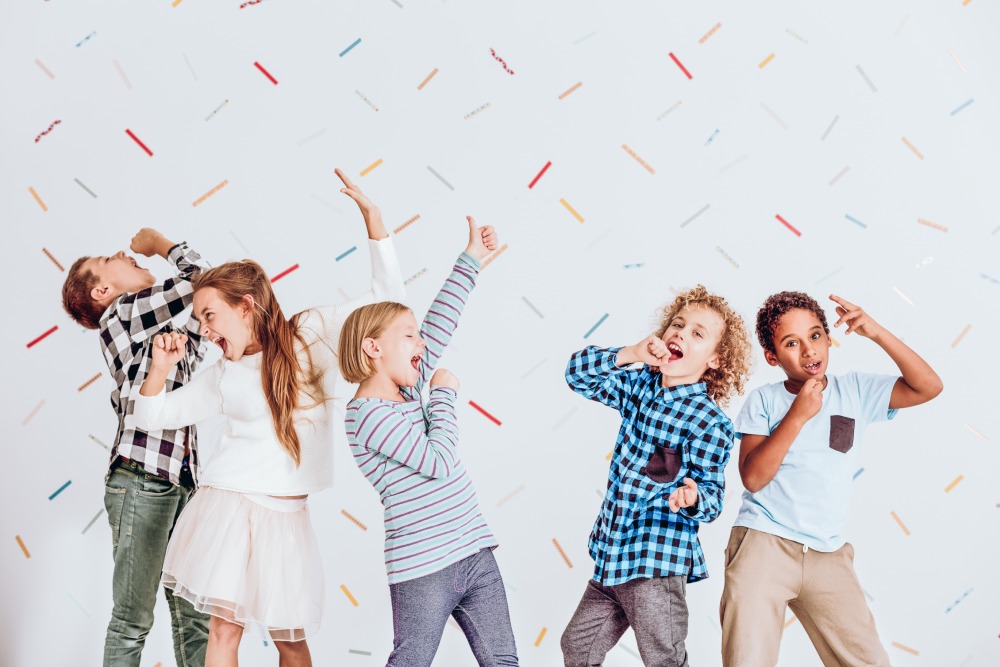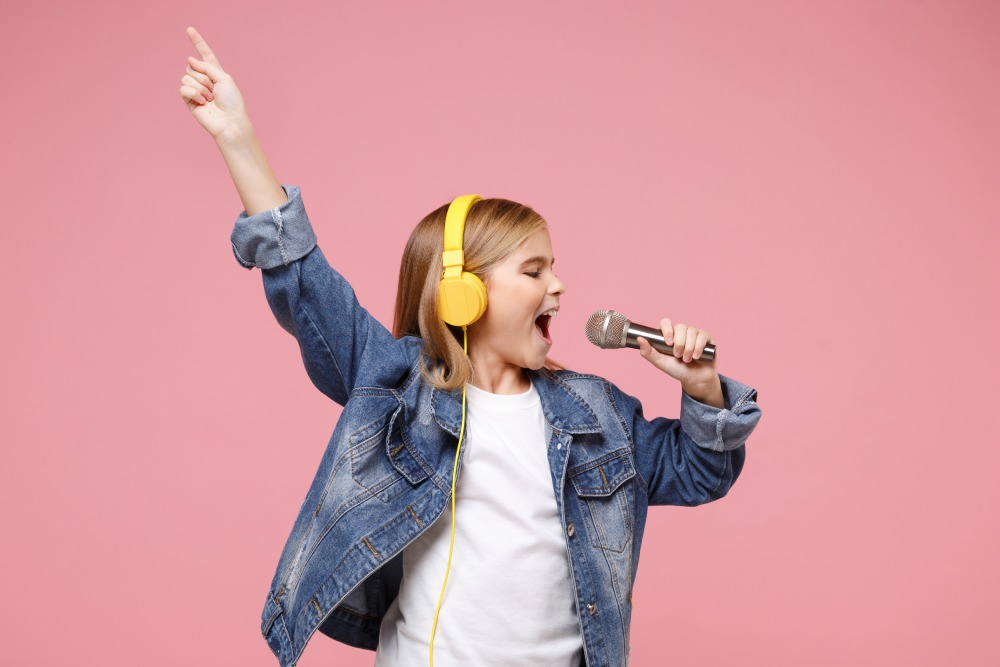When you think of a children’s Karaoke for Kids event, you might imagine colorful microphones, big smiles, and laughter echoing across a room. But beyond the fun, karaoke plays a powerful role in promoting childhood development. The simple act of singing helps build confidence, social skills, language, memory, and emotional expression. Studies show that musical activities like karaoke help children develop cognitively, emotionally, and socially.
At PlugIN, we’ve seen firsthand how a thoughtfully organized kids’ Karaoke Party within a private events setting can be both entertaining and enriching. Our state‑of‑the‑art audio‑visual systems, family‑friendly spaces, and, most importantly, a dedicated event planner ensure every child (and parent!) feels heard, supported, and celebrated. In this article, we’ll explore the many benefits of Karaoke for Kids and explain why hosting a karaoke event can be a joyful and developmentally valuable experience.
Boosting Confidence and Self‑Esteem
Celebrating Courage
Stepping up to the microphone and singing in front of peers takes bravery. Each time a child performs—even just one line—they’re taking a risk, exposing themselves to possible praise or constructive feedback. These small yet intentional moments build resilience, self-assurance, and self-confidence.
Positive Reinforcement
A successful Karaoke Party is filled with applause, supportive comments, and inclusive cheering. These affirmations reinforce positive self-perception and encourage children to trust their own voice—both literally and figuratively.
Karaoke Benefits for fostering courage are measurable. Teachers, caregivers, and parents often report visible changes in children who sing regularly: shy kids grow more expressive, and quiet children start sharing more freely.
Enhancing Language and Communication Skills
Vocabulary and Pronunciation
When kids learn lyrics, they’re learning new words, idioms, and pronunciation patterns. Singing songs improves enunciation while strengthening speech clarity. This is a key benefits of Karaoke for Kids, as it enhances early language acquisition and communication development.
Rhythm Helps Language Processing
Rhythm helps children internalize syllables and word structure. Music supports language pathways in the brain. This makes karaoke an ideal educational activity—learning happens naturally while they sing, dance, and have fun.
Supporting Memory and Cognitive Development
Lyric Recall
Learning, memorizing, and recalling lyrics is a cognitive exercise. Singing helps with memory, listening skills, pattern recognition, and attention span. When kids return to a song multiple times, they reinforce neural pathways tied to memory.
Stress‑Free Learning
Karaoke encourages learning in a natural, playful way. Children enjoy repetition. They want to perform more and more, without the pressure of classroom learning—this relaxed atmosphere promotes brain plasticity and retention.
Emotional Expression and Regulation
Music as a Mood Channel
From upbeat anthems to soothing ballads, music offers children a safe way to express emotions. Karaoke Benefits include helping kids label feelings like joy, sadness, or determination. Singing emotionally expressive songs encourages empathy and self-awareness.
Coping and Release
Music provides an outlet for releasing tension, celebrating success, or cheering someone up. A Karaoke Party theme focused on positivity can reinforce coping skills and emotional health.
Promoting Social Skills and Teamwork
Shared Performances
Duets, group songs, or ensemble performances teach collaboration. Kids learn to listen to each other, coordinate timing, share the mic, queue entrances—all part of healthy teamwork and mutual respect.
Inclusive Encouragement
A supportive karaoke environment encourages children to cheer each other on. Applause, high fives, and shared laughter foster empathy and a sense of belonging. It’s a real‑world lesson in community building.
Fine Motor Control and Coordination
Microphone Handling
Holding a mic and pressing buttons builds dexterity, especially for younger kids. Adjusting mic distance and angle also helps them develop spatial awareness.
Engagement Through Movement
Whether dancing, clapping, or using hand gestures, children learn body coordination through performance. Singing naturally incorporates gross motor engagement—another overlooked benefits of Karaoke for Kids.
Cultivating Creativity and Self‑Expression
Artistic Embellishments
Kids experiment with vocal tone, tempo, and volume—adding personal flair to lyrics. This creative play builds artistic growth, imagination, and self-expression.
Performance Experimentation
Encouraging kids to choose songs they connect with gives them agency. Desire to perform becomes a form of creative self‑brand building—an expression of identity and autonomy.
Improving Listening and Focus
Following Song Structure
Singing karaoke requires attention: staying on beat, following lyrics, watching visual prompts, and syncing with music. These tasks sharpen listening skills and mental concentration.
Taking Cues
Performing also demands listening to background tracks, audience reactions, and timing switches. These subtasks cultivate mindfulness and active listening—core Karaoke Benefits.

Educational Themes Through Song
Language and Animal Songs
Songs like “Old MacDonald” and alphabet tunes teach letters, sounds, and animal names. Fun learning is paired with repetition and melody—making karaoke an engaging educational tool.
Cultural Lyrics
Karaoke can introduce children to folk songs, cultural music, and different languages. A well-managed Karaoke Party on multicultural themes expands kids’ cultural awareness and musical appreciation.
Building Confidence in Public Settings
Safe Stage for Growth
A Karaoke for Kids event at PlugIN offers a welcoming stage environment. Children can adjust the spotlight, texture, and audience size as they feel comfortable—building ease with public performance.
Progress Tracking
Parents and planners can note how a child’s courage grows over time. Encouraging younger kids with shorter songs and bumping up complexity as they thrive creates a supportive growth pattern.
Reducing Anxiety and Encouraging Joy
Joy Releases Cortisol
Music releases dopamine and reduces stress hormones. Singing with others reduces anxiety and helps children feel a sense of consolation and inclusion—an overlooked Karaoke Benefits.
Safe Social Risk
Singing karaoke offers controlled risk. Children learn to manage feelings of stage fright and anxiety with community support and repetition. It’s a helpful life skill.
Family Bonding and Community Engagement
Shared Memory Time
Family-friendly karaoke is perfect for connecting generations. Brothers, sisters, cousins, and parents can all sing favorite tunes—creating shared memories.
Community Celebration
PlugIN’s karaoke space provides private rooms big enough for small kindergarten classes, birthday groups, and community events. It’s a comfortable space for collective celebration.
Practical Planning Tips for Kids’ Karaoke Events
Age‑Appropriate Song Selection
Choose songs with simple, repetitive lyrics and positive messages. Avoid themes that may be too romantic or adult.
Attention‑Friendly Format
Break up performances with interactive games, movement, or snack time. Keep each session short and engaging.
Microphone Hygiene
Use disposable mic covers and sanitize between uses—important during illness seasons.
Supportive Hosting
A friendly host (like PlugIN’s professional host or your dedicated event planner) keeps energy high, guides shy singers, and ensures inclusivity.
Why PlugIN Makes the Ideal Kids’ Karaoke Destination
Private Room Flexibility
Our private karaoke rooms create a safe, distraction-free environment. Kids can sing freely, and families can cheer without disrupting others.
Tech That Works for Kids
Interactive lyrics screens are touch-friendly, lyrics are large and bright, and the audio system is adjustable—customized for young voices and small groups.
Comfort, Safety & Amenities
Comfortable seating, child-safe microphones, clean restrooms, and allergy-aware snacks are part of the experience. Our dedicated event planner ensures every detail—from toxicity‑free decor to emergency contact forms—is handled seamlessly.
Fun‑First Environment
At PlugIN, we lean into joy. From colorful stage lighting to post‑song celebrations, our tech-forward setup amplifies excitement in an age-appropriate way.
Creating a Successful Kids’ Karaoke Party Theme
Birthday Themes
Themes like “Superhero Sing-Along,” “Disney Favorites,” or “Animal Safari” delight younger singers and help guide decorations, song lists, and party favors.
Educational Themes
Use karaoke for learning: “Songs of the Solar System” or “Alphabet Tunes.” Each theme becomes a creative classroom.
Multicultural Melodies
Celebrate Language Week with songs from various cultures—Spanish children’s songs, African lullabies, folk tunes from Asian regions.
Measuring Developmental Success
Observational Growth
Parents, teachers, and event planners observe increased confidence, social connection, and expressive skills during events.
Feedback & Celebrations
Provide certificates or stickers celebrating “Most Confident Singer” or “Cheer Squad Hero.” Highlighting positive reinforcement strengthens long-term memory and self-esteem.
Safety, Hygiene & Accessibility
Sanitization Routines
Clean microphones, wipe-down stations, and ventilation matter—especially in group kid settings.
Safe Sound Levels
We cap volume to safe decibels for children. PlugIN’s equipment prioritizes safety without sacrificing fun.
Flexible Seating & Mobility
Adjustable seating ensures toddlers, older siblings, and even grandparents stay comfortable and feel included.
Transitioning to Growth Activities
Structured Karaoke Classes
Offer short workshops teaching vocal warm-ups, breathing exercises, and basic melodies.
Ongoing Club Activities
Monthly children karaoke clubs build routine, skill-building, and peer connection—great for educational institutions, community centers, or after-school groups.
The Long-Term Impact
Lifelong Love of Music
Children introduced to singing early are more likely to stay engaged in musical pursuits—choirs, bands, instruments—building lifelong habits.
Academic Success
Studies link music involvement to improved performance in math, literacy, and verbal skills. Karaoke becomes both fun and foundational.
Leadership Through Performance
Kids who sing publicly gain early exposure to leadership—and emotional feedback—which fosters stronger communication and confidence.
Final Takeaways
- Karaoke for Kids is more than kid-friendly entertainment—it nurtures confidence, connection, language, memory, expression, and cooperation.
- Benefits of Karaoke for Kids extend beyond the event; they influence academic progress, social skills, emotional health, and lifelong musicality.
- A well-designed Karaoke Party—especially when supported by PlugIN’s tech, staff, and planning—creates a joyful environment where children thrive.
- Our dedicated event planner ensures the experience is safe, supportive, and developmentally aligned.
Conclusion
Karaoke isn’t just a pastime—it’s a tool. Karaoke Party events help children develop in expressive, cognitive, social, and emotional ways. With every song, they discover their voice—and with every cheer, they gain confidence.
At PlugIN, we elevate this developmental journey through kid-friendly infrastructure, safety-first practices, and expert support. From curated Karaoke for Kids playlists to interactive storytelling through song, every element is built to support growth and joy.
Ready to host a karaoke experience that helps children flourish? Contact us to plan your next event at PlugIN, where fun and development go hand in hand.


